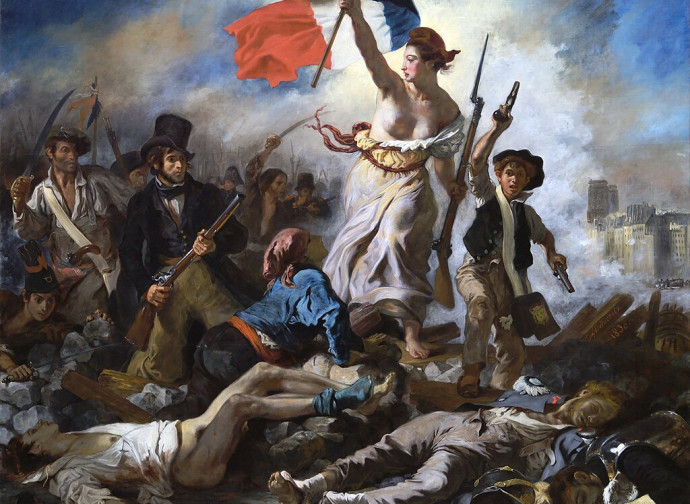The European civil war: a bitter fruit of the exclusion of God
According to some experts, the conditions for a 'European civil war' exist today, with the birth of modern ideological states founded on despair at its origin. One can only emerge from this situation with the salvation that comes from God. This article explores the thoughts of figures such as Schmitt, Nolte, Wojtyla and Ratzinger on this topical issue.

The crisis in Europe is marked not only by the war in Ukraine and the inconsistency of the European Union, but also by internal tensions within many nations. France is a significant case in point. Here, there is considerable social tension alongside strong political and institutional precariousness. The 'Bloquons tout' movement is more radical than the 'Gilets jaunes'. The large demonstration against migrants in the UK in recent days is further evidence of widespread and deep-seated social restlessness. The outcome of the recent elections in the German state of North Rhine-Westphalia further confirms that elections have become a source of conflict and proscriptions that do not end with the closing of the polls. In Italy, a 'climate of hatred' and ideological delegitimisation could cause minor conflicts to escalate.
Are the conditions right for a “European civil war”? Some observers say yes, at least in the long term. They attribute the causes to three factors: the polarisation of identity within states; the demographic decline of the indigenous population, which has led to a widespread feeling of danger and alarm at potential replacement; and the crisis of confidence in institutions. Add to this the globalising actions of powerful transnational actors and their progressive control over populations through new technologies. All of these factors can produce conflictual exasperation. This is a serious subject that deserves some reflection.
The historian Ernst Nolte devoted his major work, the essay, National Socialism and Bolshevism, to the European civil war. He also described the main features of the 'European Civil War' in a lecture he gave in Brescia on 20 April 1990, titled, The European Civil War 1917–1945. Nolte argued that a civil war does not have to be fought openly with armed combatants on both sides, as occurred in the American Civil War of 1861–1865 or the Spanish Civil War of 1936–1939. The French Revolution was also a civil war, and Europe has been the scene of civil wars ever since. The First World War was also a civil war; the short and tragic period of the Weimar Republic had bloody civil war aspects; and the Bolshevik Revolution, from October 1917 until at least 1920, took place in a civil war context. Nazism also waged a civil war in Germany, especially through the persecution of Jews. Above all, it was a huge civil war, not only between states, but also between Nazism and Bolshevism throughout Europe.
This war was fought within each nation. Some historians have also spoken of a 'civil war' in Italy, particularly in reference to the Resistance period. In the encyclical Centesimus Annus (1991), John Paul II declared that the fall of the Berlin Wall, which had divided Europe in two, marked the true end of the Second World War. He thus recognised that, from 1945 to 1989, a 'European civil war' had continued, even though no war between states had been fought.
According to Nolte, a European civil war presupposes the emergence of modern ideological states and the adoption of the principle of 'collective attribution of guilt'. Even the French Revolution saw "collective attributions of guilt". It is important to recognise that these two elements are still very much present in European societies today. One seemingly anomalous phenomenon clearly testifies to this: the legalised extermination of unborn children in all European countries, which closely resembles a 'collective attribution of guilt' by the ideological state.
Carl Schmitt also devoted many pages to the subject of the European civil war. According to him, the modern ideological state, as exemplified by Bodin and especially Hobbes, emerged from "despair", as did every modern civil war. Perhaps the first to foresee this, Tocqueville predicted that democracy would become increasingly centralised, and therefore democracy could also be seen as the site of a new 'European civil war' based on despair. Significantly, in his final book Ex captivitate salus, Schmitt states that Tocqueville lacked a conception of salvation that would enable him to overcome his despair.
Thus, the theme of the European civil war leads us to the concepts of redemption and salvation, which bring us back to John Paul II. Even today, he said, after the end of the great ideologies and totalitarianisms, a great ideology of evil remains: consider the 'legal extermination of conceived and unborn human beings'. This, he said, happens because God has been rejected as creator, and therefore as the source of the determination of what is good and what is evil. John Paul II observed that even today, a special 'European civil war' continues to exist, resulting in 'attributions of collective guilt', and he saw its origin in modern despair, which is the other face of the pride of modernity. In the book Memory and Identity, he writes that with original sin, 'man was left alone: alone as the creator of his own history and civilisation, alone as the one who decides what is good and what is bad'.
Joseph Ratzinger's reflections on Europe, as Benedict XVI, complete the picture: Europe has alienated itself from God and, in doing so, has not only deprived itself of the God of Abraham, Isaac and Jacob, but also of the God of the philosophers. In other words, it has reduced itself to the 'self-limitation of reason'. It has thus inevitably fallen from religious despair to the despair of reason. This is why Europe hates itself and is proceeding towards the 'self-destruction of European consciousness': Europe against Europe — a European civil war.
